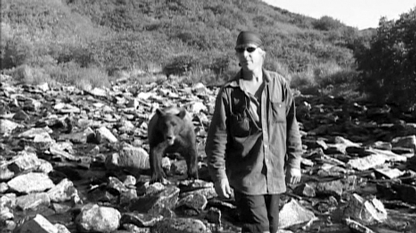Documentary incorporates footage shot by man devoured by bears he swore to protect
Grizzly Man” is a dialogue with a dead man. A documentary about grizzly bear-obsessed Timothy Treadwell, who spent 13 summers living among the animals and was killed by one in 2003, it treats its subject as director Werner Herzog’s peer. In fact, it incorporates so much footage shot by Treadwell that he could justifiably be credited as co-director.
While Herzog’s tone mixes empathy and critique, there’s also a surprising amount of identification on his part. At one point, his voice-over cuts in to tell us how much he admires Treadwell’s skill as a filmmaker. Indeed, being willing to get within feet or even inches of grizzly bears can lead to some breathtaking images.
“Grizzly Man” follows an unusual structure. Very early on, it informs us of Treadwell’s death. He may have angrily rejected “the people’s world,” as he called it, but he was highly dependent on one piece of technology––his video camera. At first, his tapes look like a harmless, public-access cable version of an “Animal Planet” episode. (Ironically, Treadwell may find posthumous TV stardom, since the Discovery Channel co-produced this film.)
It’s never entirely clear what audience Treadwell’s tapes are aimed at, although he lectured to schoolchildren and even appeared once on David Letterman’s show. Although he seems like a charming, if naïve, eccentric, Herzog gradually introduces video in which Treadwell appears more and more unhinged. Herzog’s documentaries have rarely relied upon found footage, but “Grizzly Man” makes better use of it than any film since Andrew Jarecki’s “Capturing the Friedmans.”
An hour into “Grizzly Man,” Herzog finally serves up Treadwell’s early life story, although his discoveries make Treadwell’s behavior seem even more mysterious. A straight-A student, he grew up on Long Island. However, he began drinking and taking drugs when he went to college, then dropped out and moved back to his parents’ home. After moving to California, he suffered a near-fatal overdose and reinvented himself as an orphaned Australian surfer, although friends note that he never quite got the accent right. (Despite his Alaskan summer sojourns, there’s something very Laguna Beach about his looks and bearing.) Pursuing an acting career, he lost a “Cheers” audition to Woody Harrelson, which really depressed him.
Many recovering addicts turn to God, but he turned to animals in an attempt to stop drinking. It worked.
Quite prolific, Herzog has already completed a new film, “The Wild Blue Yonder,” which will premiere at the Venice Film Festival next month, after “Grizzly Man” debuted at Sundance this past winter. While some of his recent work has yet to arrive in New York, his films are enjoying a minor commercial renaissance now; following “The White Diamond” and “Wheel of Time,” this is his third film to open in the past few months. While little of his work is shoddy, he seems to have taken particular care with “Grizzly Man.” The narration is extremely well-written and insightful. The score, improvised over two days by a group led by British folk/rock guitarist Richard Thompson, propels Treadwell’s footage and adds to the chill of its Alaskan landscapes. Drawn from 100 hours, that video is carefully chosen. Herzog supplements its gaps, like the absence of Treadwell’s last girlfriend Amie Huguenard, who died alongside him.
Herzog’s long been fascinated by outcasts, be they innocents or power-mad despots who try to remake the world in their image, like the characters played by Klaus Kinski in “Aguirre” and “Fitzcarraldo.” This interest is part-and-parcel of “Grizzly Man,” though Treadwell blurs the line between the two categories. He had no desire to impose himself on other people, yet he tried to force the bears to accept him. A post-humanist of sorts, he identified more with animals than people, as if he could become one by force of will. Although he refers several times to foxes or bears as the bosses of their surroundings, he saw himself as their protector, saving them from menacing poachers who existed mostly in his head.
At his most simplistic, Herzog has celebrated social ostracism as a holy state. “Grizzly Man” takes a different view of things. While remaining respectful of Treadwell, Herzog openly disagrees with him on a number of points. He sees no transcendence in nature. At many points, “Grizzly Man” recalls “My Best Fiend,” Herzog’s documentary about his stormy relationship with Kinski.
In front of his camera, Treadwell acted like the star he could have been. At a certain point, he seems to lose control of the “performance.” It turns into shamanism. In the midst of a drought, he calls on various gods to produce rain. Miraculously, his plea is answered.
Herzog’s present-day interviews, while they add needed context and common sense, pale next to Treadwell himself. The man was a mess of contradictions: identifying with nature while still acting like he was auditioning for some role. Ultimately, he performed to an audience consisting of his camera and a few hostile animals. Sympathizing deeply with Treadwell’s alienation and quest for transcendence, “Grizzly Man” offers a cautionary tale about the limits and dangerous of such an attitude. Herzog suggests that being human makes it impossible to shake the bounds of “the people’s world.”
gaycitynews.com

































